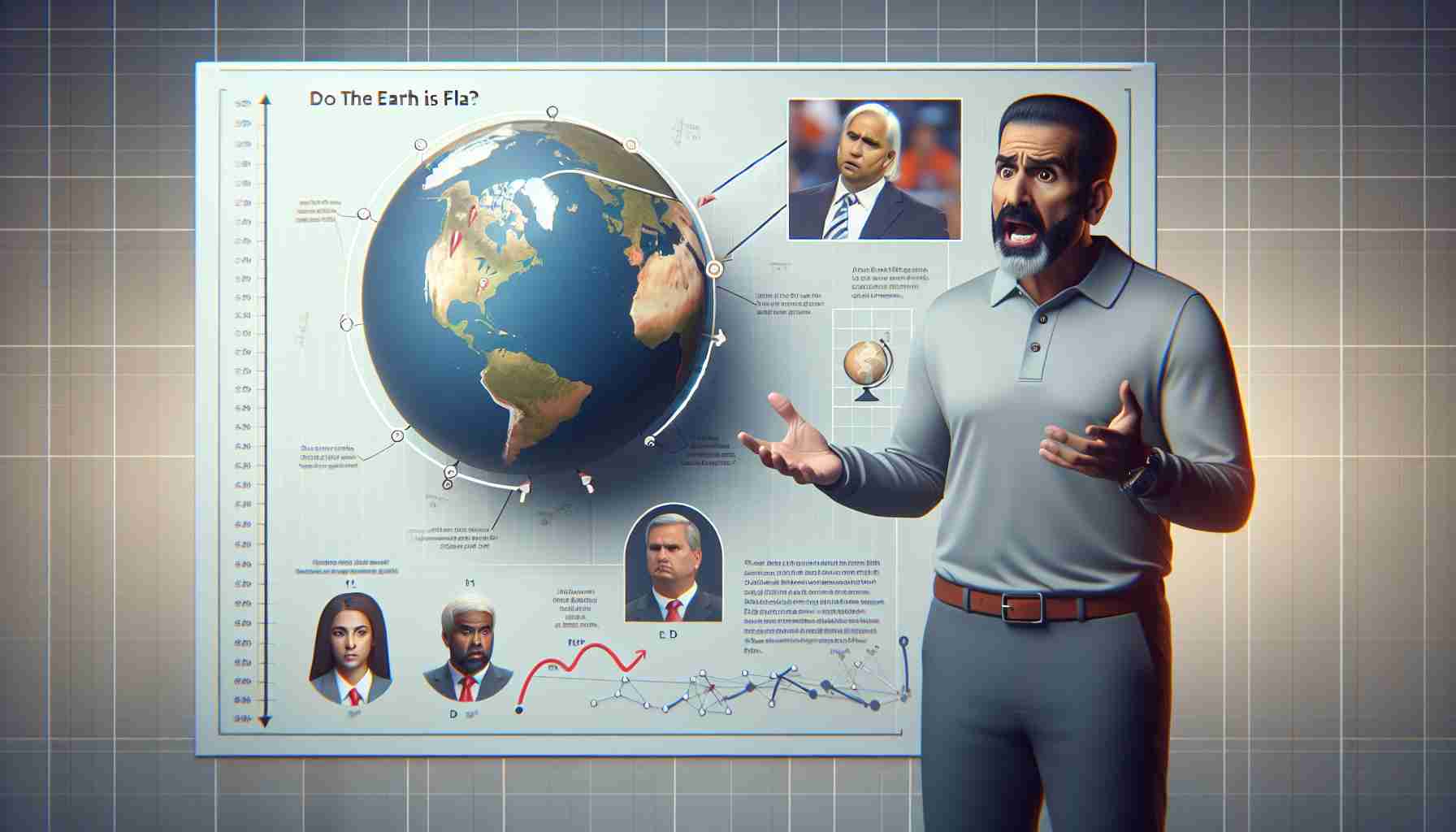In the world of lower-tier Spanish football, Javi Poves has become a household name, thanks to his eye-catching statements and fiery exchanges. Recently, after a heated press confrontation with the vice-president of Cacereño, he appeared on the morning show “Espejo Público.” During this controversial interview, he challenged the program to host a debate regarding the shape of the Earth, highlighting his firm belief in flat Earth theories.
Poves’s opinions are far from mainstream. He boldly claimed that the moon landing was fabricated and expressed that historical figures like Galileo deserved no special reverence because their theories cannot be fully verified. He even stirred further controversy by suggesting that children belong to the state once registered. His assertions have drawn sharp reactions, particularly during his exchange with co-host Gonzalo Miró, which reached a boiling point when Poves labeled Miró a “laboratory rat.”
In a baffling comparison, he explained that just like lab rats subjected to experiments, society is trapped in an oppressive system. His statements prompted shock and discomfort among the show’s panel. Moreover, he openly invited “Espejo Público” to arrange a debate featuring experts who would clash with his unconventional views. While Poves acknowledges that support for his beliefs may be limited in Spanish circles, he insists that a larger following exists in English-speaking communities.
Challenging Norms: The Cultural Footprint of Controversial Figures
The emergence of individuals like Javi Poves in the realm of sports and media carries significant implications for society, culture, and even the global economy. Poves represents a growing trend where fringe beliefs gain visibility, driven by social media and a polarized media landscape. This phenomenon not only influences how marginalized ideas enter mainstream discussions but also reflects a broader mistrust in established institutions, from science to government.
The grip of conspiracy theories—such as those surrounding the flat Earth—raises pressing questions regarding information consumption in the digital age. As mistrust flourishes, traditional media outlets may struggle to maintain credibility, while alternative narratives proliferate. This can skew public discourse, leading to division and an increasingly fragmented societal landscape.
Environmentally, the spread of such ideologies can erode support for critical scientific policies. If influential figures dismiss empirical evidence in climate science, the ramifications could stall progress on pressing global issues like climate change, which relies on widespread acknowledgment and action for sustainable development.
Looking to the future, we may witness a rise in figures who capitalize on controversy, appealing to echo chambers that thrive on sensationalism. This evolution in cultural discourse underscores the importance of critical thinking and media literacy, as society navigates a complex information ecosystem that shapes perceptions and policies worldwide.
The Controversial Views of Javi Poves: A Deep Dive into His Beliefs and Their Impact
Overview of Javi Poves
Javi Poves, a figure gaining notoriety in lower-tier Spanish football, is known not only for his contributions to the sport but also for his polarizing views on various planetary and historical subjects. His appearances on media platforms like “Espejo Público” have made waves, particularly through his confrontational style and provocative statements.
Key Controversies and Beliefs
Flat Earth Theory
One of the most striking aspects of Poves’s public persona is his firm belief in the flat Earth theory. He has invited discussion and debate over this topic, indicating that he is keen to present his perspective against established scientific consensus. This controversial stance sets him apart from many public figures, often relegating him to the fringes of conventional thought.
Skepticism of Historical Narratives
In addition to flat Earth beliefs, Poves has expressed skepticism regarding widely accepted historical events, notably claiming that the moon landing was staged. He argues that many historical figures, including renowned scientists like Galileo, should not be revered as their contributions lack absolute verification. This radical reexamination of accepted history invites scrutiny and critique from both the scientific community and the public.
Social Perspectives
Poves has also made provocative statements about societal structures, suggesting that children become “property of the state” once they are registered. Such assertions have raised eyebrows and prompted discussions about individual rights and state authority, reflecting his broader critique of societal norms.
Media Appearance and Reactions
During a particularly heated segment on “Espejo Público,” Poves’s fiery exchange with co-host Gonzalo Miró showcased the tension surrounding his opinions. Poves referred to Miró as a “laboratory rat,” using this metaphor to express his view that society is subjected to systemic control and experimentation. This analogy aimed to illustrate his belief in a greater conspiracy, ostensibly drawing parallels between human society and laboratory practices.
The reactions from the show’s panel were notable, with many expressing shock and discomfort at his comparison. Such moments have propelled Poves into the spotlight, raising questions about the boundaries of acceptable discourse in public debates.
Insights into Poves’s Following
Despite the controversial nature of his beliefs, Poves claims that while support for his views may be limited within Spanish discourse, there is a burgeoning audience in English-speaking countries. This observation points to a potential trend where fringe theories might find a more receptive audience abroad, highlighting differences in cultural perceptions regarding such topics.
Implications for Future Discussions
The rising visibility of figures like Javi Poves may indicate a larger trend towards challenging orthodox views, prompting re-evaluations of historical narratives and scientific consensus. This situation raises questions about how society navigates controversial beliefs and the impact of media platforms in shaping public perception.
Conclusion
Javi Poves is undoubtedly a provocative figure whose beliefs challenge mainstream science and history. The discourse surrounding his views represents a broader conversation about the boundaries of opinion and the role of public media in addressing controversial topics. As discussions continue, it will be crucial to monitor how such narratives evolve and influence the broader landscape of public debate.
For more on topics related to societal debates and controversial figures, visit Example Domain.
